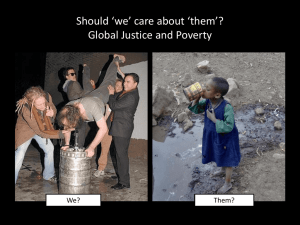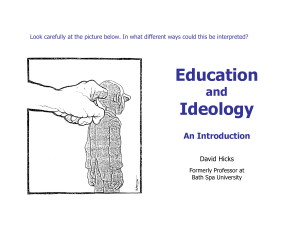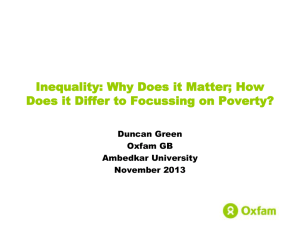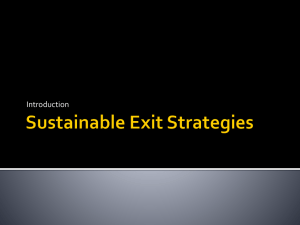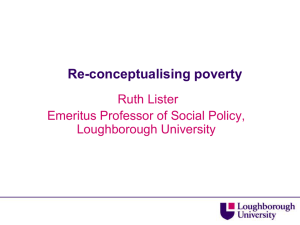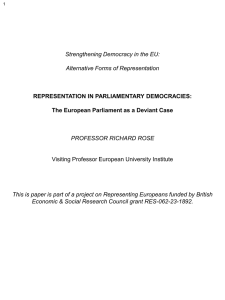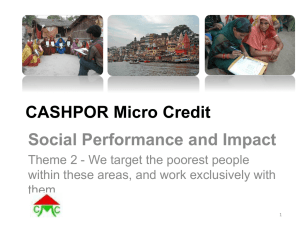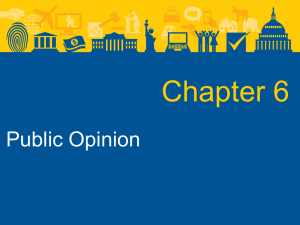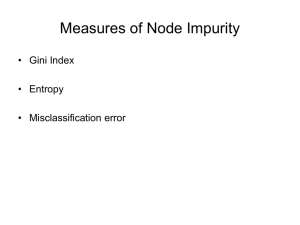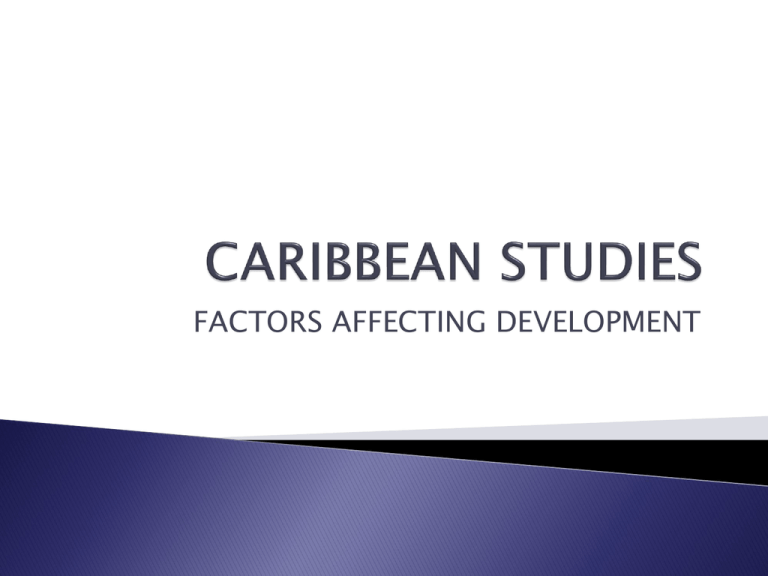
FACTORS AFFECTING DEVELOPMENT
Political ideologies
Distribution of wealth
Changing class boundaries
Natural and man-made disasters
Impact of productive sector
Tourism
Ideologies are the sets of basic beliefs about
the political, economic, social and cultural
affairs held by the majority of people within
as society.
An ideology is a collection of ideas. Typically,
each ideology contains certain ideas on what
it considers to be the best form of
government and the best economic system
(e.g. capitalism, socialism, etc.).
A political ideology largely concerns itself
with how to allocate power and to what ends
it should be used.
Political ideologies have two dimensions:
◦ Goals: How society should function or be organized.
◦ Methods: The most appropriate way to achieve this
goal.
Ideologies also identify themselves by their
position on the political spectrum (such as
the left, the centre or the right), though this
is very often controversial.
THE LEFT / LEFT-WING
◦ liberty. The freedom of speech and the right to
dissent.
◦ equality. A classless society with the redistribution
of wealth through a welfare state.
◦ fraternity. The communal brotherhood, working
and living as one.
THE RIGHT/ RIGHT-WING
◦ authority. The preservation of order through an
evolved authority.
◦ hierarchy. The continuation of the existing social
order.
◦ property. The right to private ownership.
absolutism. System where the rulers have unlimited
control.
anarchism. Society without government, laws, police or
other authority. System of self-control.
aristocracy. The privilege of social class whose members
possess disproportionately large percentage of society's
wealth, prestige and political influence.
autocracy. Supreme political power is in the hands of one
person whose decision are unregulated..
capitalism. Right-wing political system where the
principle means of production and distribution are in
private hands.
communism. Extreme left-wing ideology based on the
revolutionary socialist teachings of Marx. Collective
ownership and a planned economy. Each should work to
their capability and receive according to their needs.
conservatism. Governmental system where the existing
institution are maintained, emphasizing free-enterprise
and minimal governmental intervention.
democracy. Government by the people usually through
elected representatives.
dictatorship. Government by a single person with absolute
control over the resources of the state.
egalitaranism. Belief where all citizens have equal rights
and privileges.
fascism. Extreme right-wing ideology where the existing
social order is protected by the forcible suppression of the
working class.
imperialism. The extension of power and rule beyond
established geographical boundaries.
liberalism. Representative government, free-speech,
abolition of class privilege and state protection of the
individual.
Marxism. Developed by Marx and Engles, it proposes that
all is subject to change and resistance to change
necessitates the overthrow of the system through class
struggle.
Maoism. Interpretation of Marxist communism
emphasizing the development of agriculture.
Monarchy. A form of rule in which the head of state is a
King or Queen.
nationalism. The unification of the state and release from
foreign rule.
oligarchy. A system of government in which virtually all
power is held a small number of wealthy people who shape
policy to benefit themselves.
populism. Collective noun for the ideologies
which demand the redistribution of political
power and economic leadership to the 'common
people'.
socialism. Left-wing political system where the
principle means of production, distribution and
exchange are in common ownership.
theocracy. Rule by the church.
totalitarianism. Government control of all
activities.
Trotskyism. Form of Marxism incorporating the
concept of permanent revolution.
Promote
◦ Capitalist or free state/enterprise- dominant
political ideology of the Caribbean
Hinder
◦ Marxist-type revolutions- attempts at increasing
human equity (Grenada, 1979; Cuba,1959; Guyana,
1960-70’s)
Promote
Hinder
◦ Social Mobility: the movement of a person from one status
to another, either between generations or within a person's
adult career.
◦ Measure: index of social and economic equalization
◦ Poverty:- unable to provide basic needs
If human development is about enlarging choices, poverty
means that most basic opportunities and choices to human
development are denied. From a human development
perspective, poverty means more than the lack of what is
necessary for material well-being. Recognising the poverty
of choices and opportunities implies that poverty must be
addressed in all its dimensions, not income alone.
◦ Inequality:◦ Measure:
Levels of income
Human poverty Index: a measurement system based
on what is lacking in different areas of the world. and
it gathers data in developing countries and in those
with higher incomes so a basis for comparison
Gini Index-The Gini index is defined as a ratio of the
areas on the Lorenz curve diagram.
The Gini Index is a measure of the inequality of a
distribution, a value of 0 expressing total equality and
a value of 100 maximal inequality.
Gini Index Values (2004)
◦ Haiti -65
◦ St. Vincent & the Grenadines- 60
◦ U.S. – 36
High levels of poverty can coincide with a
high Gini Index e.g. St. Vincent & the
Grenadines
Low levels of poverty can coincide with a high
Gini Index e.g. Antigua & Barbuda
Promote
◦ Social Mobility: the movement of a person from one
status to another, either between generations or
within a person's adult career.
Hinder
◦ Social Stratification: a hierarchy of positions with regard
to economic production which influences the social
rewards to those in the positions.
◦ Social Exclusion
“Social exclusion is a broader concept than poverty,
encompassing not only low material means but the
inability to participate effectively in economic, social,
political and cultural life and in some characterisations
alienation and distance from mainstream society” (Duffy,
1995).
Promote
◦ Employment generated
◦ Increased planning: social, physical
◦ Infrastructural development: roads, bridges etc.
Hinder
◦ Destruction of the environment
Man-made, Natural
◦ Changes in developmental plans
Immediate aid
Diversion of funds and resources
Promote
◦ Reduced dependency on imports
◦ Increased foreign exchange earnings
◦ Employment generated
Hinder
◦ Increased environmental degradation
Pollution
Toxicity
Global warming / Carbon footprint
Promote
◦ Human resources development; skills
◦ Economic Development: jobs, foreign exchange
◦ Increased Linkages: agricultural development
Hinder
◦ Increased environmental degradation
Pollution/Toxicity
Beach erosion, Habitat Destruction
◦ Resentment among locals/Racial tensions
◦ Leakage: profits leave country
The three indicators of the human poverty index
(HPI)
◦ The first deprivation relates to survival: the likeliness of
death at a relatively early age and is represented by the
probability of not surviving to ages 40 and 60
respectively for the HPI-1 and HPI-2.
◦ The second dimension relates to knowledge: being
excluded from the world of reading and communication
and is measured by the percentage of adults who are
illiterate.
◦ The third aspect relates to a decent standard of living, in
particular, overall economic provisioning.
http://www.fisicx.com/quickreference/politic
s/ideologies.html
http://en.wikipedia.org/wiki/List_of_political_
ideologies
http://www.sociologyguide.com/questions/s
ocial-stratification.php
http://cop.mdgasiapacific.org/files/cop/APMDG-Social/20071113_egm_avatthi.pdf
(all rights reserved by relevant authors)




